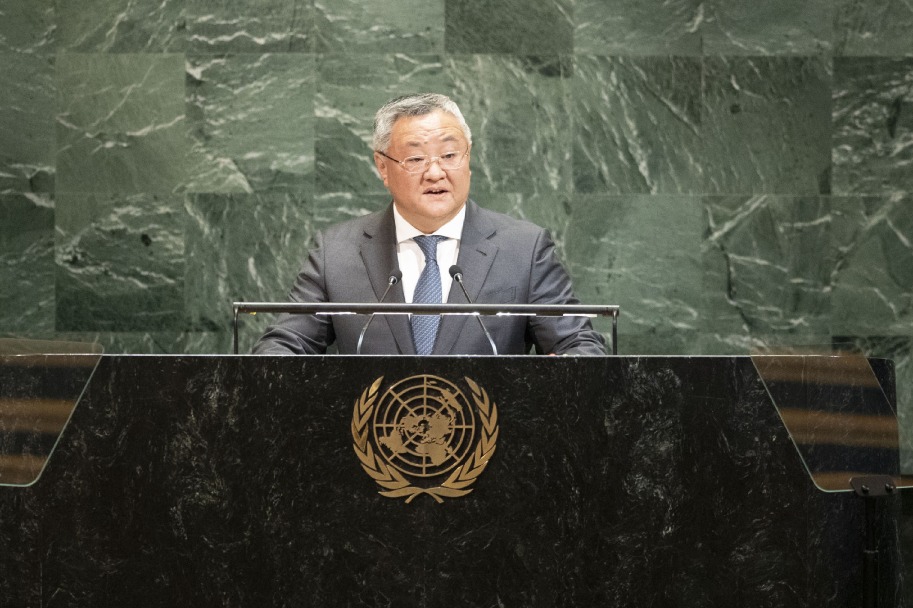China vows to continue support for biodiversity


Biodiversity is the foundation of human existence and lifeblood of the shared future of all life on Earth. Since 1992, when the Convention on Biological Diversity was adopted, it has become one of the most influential environmental conventions of the United Nations.
As one of the first signatories to the convention, China attaches great importance to biodiversity conservation. It will hold the 15th meeting of the Conference of the Parties to the Convention on Biological Diversity in Kunming, the capital of Yunnan province, in 2020. With the theme "Ecological Civilization-Building a Shared Future for All Life on Earth", the meeting will highlight the necessity of respecting nature, following natural rules and protecting the environment to achieve sustainable use of resources and benefit from sharing biodiversity conservation by 2050.
With the guiding principle of President Xi Jinping's thoughts on ecological civilization, China has established the National Committee for Biodiversity Conservation, implemented the China National Biodiversity Conservation Strategy and Action Plan (2011-30), and built a monitoring network, making significant progress in advancing the Aichi Biodiversity Targets to be achieved by 2020. The targets, decided upon at the Conference of Parties to the Convention in Nagoya, Japan, in 2010, are intended to help countries measure their progress in preventing the loss of biodiversity.
China's mainstreaming of biodiversity conservation has been speeded up in the past few years since the concept has been incorporated into such economic and social strategies as the 13th Five-Year Plan (2016-20).
At the same time, the formulation of policies, laws and regulations was accelerated. China has issued guidelines such as the Master Plan for the Reform for Ecological Progress, the Guidelines on Defining and Supervising the Ecological Red Lines, and the Opinions on Improving the Ecological Protection Compensation Mechanism. Related laws and regulations also came into force, such as the Regulations on Natural Reserves, the Law on Wildlife Protection and the Forest Law.
Progress has been made in the natural reserve system-in particular national parks. By the end of 2017, protected areas in the country accounted for about 18 percent of the total land area, achieving the Aichi targets of 17 percent ahead of schedule. The proportion of wild animal and plant species that are protected in the natural reserves reached 89 percent and 86 percent, respectively.
The ecological red lines have been steadily defined to protect areas with the most important ecological functions and the most ecologically sensitive environment, which is essential for mitigating climate changes and maintaining biodiversity through nature-based solutions. The areas under the protection of the ecological red lines are home to about 95 percent of the rare and endangered species and their habitats in China.
Social participation and public awareness have been improved. Enterprises are encouraged to participate in biodiversity conservation, and NGOs and the private sector encouraged to support implementation of the convention. The law, revised in 2014, stipulates that NGOs can file public interest lawsuits on environmental pollution and ecological damage, which has improved participation of the organizations.
China has fulfilled its commitment to international conventions on the environment by cooperating with more than 100 countries, signing nearly 150 cooperation documents with more than 60 countries and international organizations, and developing cooperation mechanisms with many national, international and regional organizations. By launching biodiversity projects with other countries, it has made contributions to global biodiversity conservation.
However, biodiversity conservation still faces great challenges. Internationally, the Global Assessment Report on Biodiversity and Ecosystem Services, released at the seventh plenary session of the Intergovernmental Science-Policy Platform on Biodiversity and Ecosystem Services in Paris in May, pointed out that only four of the 20 Aichi targets had made steady progress, and biodiversity has continued to deteriorate.
Domestically, the China Biodiversity Red List shows that domestic threatened species of the higher plants and vertebrates account for 10.9 percent and 21.4 percent, respectively, of the total evaluated species. The decline of biodiversity has not been checked yet.
Building a shared future for all life on Earth is in line with the trend of green development in the international community and common aspiration of people worldwide. China will participate in global environmental governance cooperation and work with the international community for global biodiversity preservation.
China will continue its efforts to make the 15th meeting of the Conference of the Parties a success. The meeting will summarize the progress of global biodiversity conservation over the past decades and develop a blueprint for the next decade. China will fulfill its obligations as the host country, promote the development of a post-2020 global biodiversity framework, and settle supportive measures ahead of time.
It will continue to integrate biodiversity conservation into the policies, regulations and development plans of related departments on agriculture, forestry, fishery and finance.
It will also improve international cooperation on biodiversity conservation. China will promote innovative, coordinated, green, open and shared development, improve dialogue and cooperation with other countries, regions and international organizations on biodiversity conservation and green development, and shoulder its responsibility to contribute to global ecological security.
The author is minister of ecology and environment. The views do not necessarily reflect those of China Daily.































